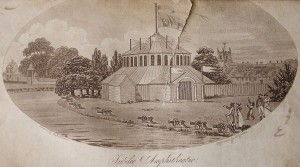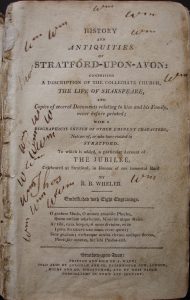Today, 7 September 2019, is the 250th anniversary of the highlight of David Garrick’s Shakespeare Jubilee. In the specially-built amphitheatre Garrick delivered his Ode, a long piece of verse consisting of spoken sections interspersed with airs delivered by some of the finest singers of the day. Although the words have survived, much of the music has not, and in 2016 concerts were given in which the Ode was spoken by actor Samuel West and new music was composed by Sally Beamish.
The Ode, brilliantly delivered by Garrick, was the most successful part of the whole festival. Although the Jubilee is criticised for its lack of Shakespeare in performance, that was never the point of this festival. Garrick had spent his life performing Shakespeare: why come all the way to Stratford-upon-Avon just to perform the plays which the audience had already seen beautifully staged at Drury Lane? The temporary, wooden Amphitheatre couldn’t rival a proper theatre, and there was no suggestion that it should try. Nor did he want to simply perform some of his favourite speeches. What he did do was to establish Shakespeare in his own environment for the first time. So Shakespeare is “Nature’s Glory, Fancy’s Child”, and from the very beginning of the Ode,
Blest genius of the isle,
……that demi-god!
Who Avon’s flow’ry margin trod,
While sportive Fancy round him flew;
Where Nature led him by the hand,
Instructed him in all she knew,
And gave him absolute command!
The Ode, praising Shakespeare’s rustic roots and the inspiration they provided, gave Warwickshire, and England as a whole, a bigger claim to Shakespeare. He was a divinely inspired writer, not only a writer of plays for the London stage. Garrick praised the man, using phrases based on Shakespeare from plays including Romeo and Juliet, Macbeth and A Midsummer Night’s Dream as well as noting “We ne’er shall look upon his like again”, a near-quotation from Hamlet.
The Jubilee became almost a legend, an event unlike any other. So important was it that local antiquary Robert Bell Wheler included the Jubilee in his 1806 book on the History and Antiquities of Stratford-upon-Avon. It seems incongruous now that as well as chapters on historic buildings like the Church is a whole section on an event that had taken place only 37 years before. He included a description, the full text of the Ode, the speech Garrick gave afterwards praising Shakespeare’s skill as a writer, and the words of the songs written for the Jubilee under the collective title Shakespeare’s Garland. Wheler was not even alive at the time but as a child would have heard lots of stories about the Jubilee from locals including his own parents.
He wrote: “ The elegant Ode met with the most universal approbation and applause: the recitative parts were spoken by Mr Garrick who perhaps, in all the characters in which he ever appeared, never exerted more powers, or with greater variety and judgement, or ever caused a greater emotion, or made a stronger impression on the breasts of his auditors; he launched, indeed, almost beyond himself! In fact, though the turbulent applause gave him frequent interruption, yet it was generally allowed, that the Ode, in point of poetical merit, no less than the speaker, as to his elocution and mode of delivery, was justly entitled to universal admiration…. In short, it was allowed by all who had the happiness to be present at the recital of this Ode, that there never was exhibited in England, a performance more pleasing, more grand, or more worthy the memory of Shakespeare; and in which the genius and talents of Garrick (by whose enchanting powers it was rendered superior to criticism), was so thoroughly admirable, and gave so perfect a satisfaction”.
Garrick knew he had a winner with the Ode. It quickly appeared in print and as early as 30 September in Drury Lane he included the first performance of it “in the Manner it was performed in Stratford”. This proved so successful that the other serious London theatre, Covent Garden, put on its own version and Garrick quickly responded. He expanded the Ode into a two-act afterpiece called The Jubilee that included scenes with comic yokels, the Ode, and the spectacular procession which he had been forced to cancel in the streets of Stratford. It was performed a record 153 times, the longest run of any London production, and cemented Drury Lane’s place as the playhouse sacred to Shakespeare. A great result for the Jubilee that many dismissed as a failure.



